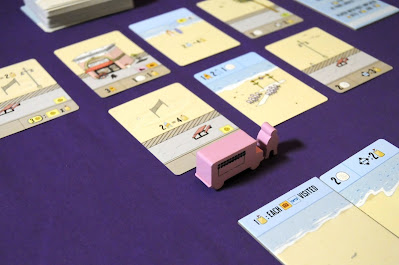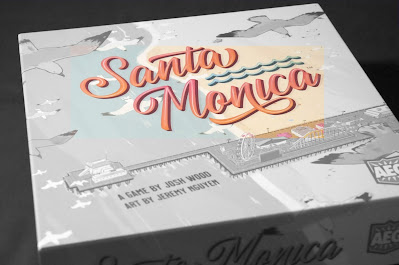SANTA MONICA
a review of the board game Designed by Josh Wood
Players: 2-4 Time Investment: 35-40 min
Rating:
Game Aesthetic
Components
The feature tiles, which indicate the starting point of the boardwalk, are a very nice sturdy cardboard. It does illicit some confidence in one's ability to build out their boardwalk, as good foundations are a must.
Santa Monica's real shining stars are the wooden components, though. The meeples represent VIPs, tourists, and locals that meander about your boardwalk. Tourists sport a cute camera about their necks, while locals are of course the coolest kids on the block sporting sunglasses. VIPs... are kind of just there. Like they prefer. Please don't ask for a photo. Then, there are the cute sand dollars with lovely golden detailing and the cute pink food truck. Every one of the wooden components adds to the fun.
The rest of the components are standard cards, though the finish on them is very nice. There isn't much card handling in the game considering everything is focused on an unconventional tableau build -- since thematically you are constructing a boardwalk area -- so don't think about that part too much. On that note, this may also mean you don't need to spend precious time sleeving.
 |
| Locals are always the coolest on the boardwalk with their sunglasses and carefree attitude. We live here, who needs a camera? |
Artwork by Brigette Indelicato , Jeremy Nguyen and Josh Wood
Can we talk about this box art for a moment? And the palette, too. Takes you back to the summertime, maybe during the times where surfing had a lifestyle surrounding it. Everything is bright, pastel and beachy keen.
The details on the individual cards whether they are on the sidewalk or on the beach itself are charming. You'll see weddings in there, relaxing beach activities,
and cute stores. The style in which all things are drawn also is reminiscent of old cartoon shows, which furthers the inviting feeling (at least for me).
The First Turn
Options
It's fairly clear that the beginning of the game that you're going to draft a card. The rules state that your two options are to select a feature card or use a sand dollar action to acquire cards in a different way. From past playthroughs more often than not you don't have enough sand dollars to start with so your likely only other option is to draft. This makes it easy and frankly I like that the game forces you to start making decisions right away. It also makes it easy to learn and/or teach the game because the turn overview is so straightforward.
From there, some of the deeper strategy is revealed through deciding what side of your feature tile your feature cards will go. There can be opportunities to swap these cards around in the future depending on what kind of sand dollar actions you have available, but for the most part you are deciding the permanent location on the beach or the sidewalk. Games that have variable starting powers, resources and/or objectives are helpful in narrowing down what an applicable strategy would be, and Santa Monica does just that. So, when in doubt, check out what your feature tile is all about, what location tags are associated to it, and then pair up feature cards accordingly.
 |
| When deciding between cards sometimes the incentive from the food truck and the foodie can tip the scale |
Rewards and Objectives
Aspects of the feature cards can impact where the meeples go, what scoring chains can be developed, or how you progress on the public objective card. Considering this section is literally labeled "Rewards and Objectives", perhaps starting with the objective card is a great option.
I've found that the objective card, while it may be tempting to try and dedicate your game play to your feature tile, is full of points to be had. It also usually comes with something detailed that is a penalty at the end of the game so an objective to avoid said penalty is also a viable goal. However, unlike other games I've played, I have had success just taking things moment to moment while leaving room for changing a plan in the future.
Individual feature cards can provide sand dollars, and almost always the sand dollar actions are the better way to acquire cards for your boardwalk. The reason being, it will provide more actions to take during the game.
Encouraging your VIP to walk to specific parts of the boardwalk can also be a fun theme to drive your objectives, because you can either design the boardwalk with the locals and/or tourists in mind, just the VIP, or a combination of both. I can imagine that there are cool vacation spots that are not for the "little people" but in my opinion -- both in principle and in terms of this game -- the boardwalks that really thrive are for the people.
Ability to Pivot
You'll know whether you can pivot in this game right away, based on the sand dollar actions. If there isn't anything that will let you swap cards in your boardwalk, and since this is a game where scoring is very heavily dependent on positioning of the cards, you can assume that pivoting is unwise. Planning from the get go is a must, but luckily the types of decisions you are making are limited to just looking for tags and patterns.
I would say the one thing that the game does not have a lot of room for is population control. Several feature cards bring in the crowds, and sometimes you don't want too many people hanging around doing nothing.
Game End
When one player has placed their 14th feature card, it triggers the end of the game. Everyone gets equal turns and then you start to tally everything up! The cards themselves score off of location tags, or, if you're lucky, make those sand dollars actually worth something. That's right, sand dollars are meant to be spent and if you haven't been spending them then you're SOL. Other scoring opportunities, if you were paying attention to them, are activities on the cards (they'll have a dashed ring with a population requirement), or footprints from VIPs based on your feature tile. Finally, like I mentioned before, the objective card is also evaluated.





